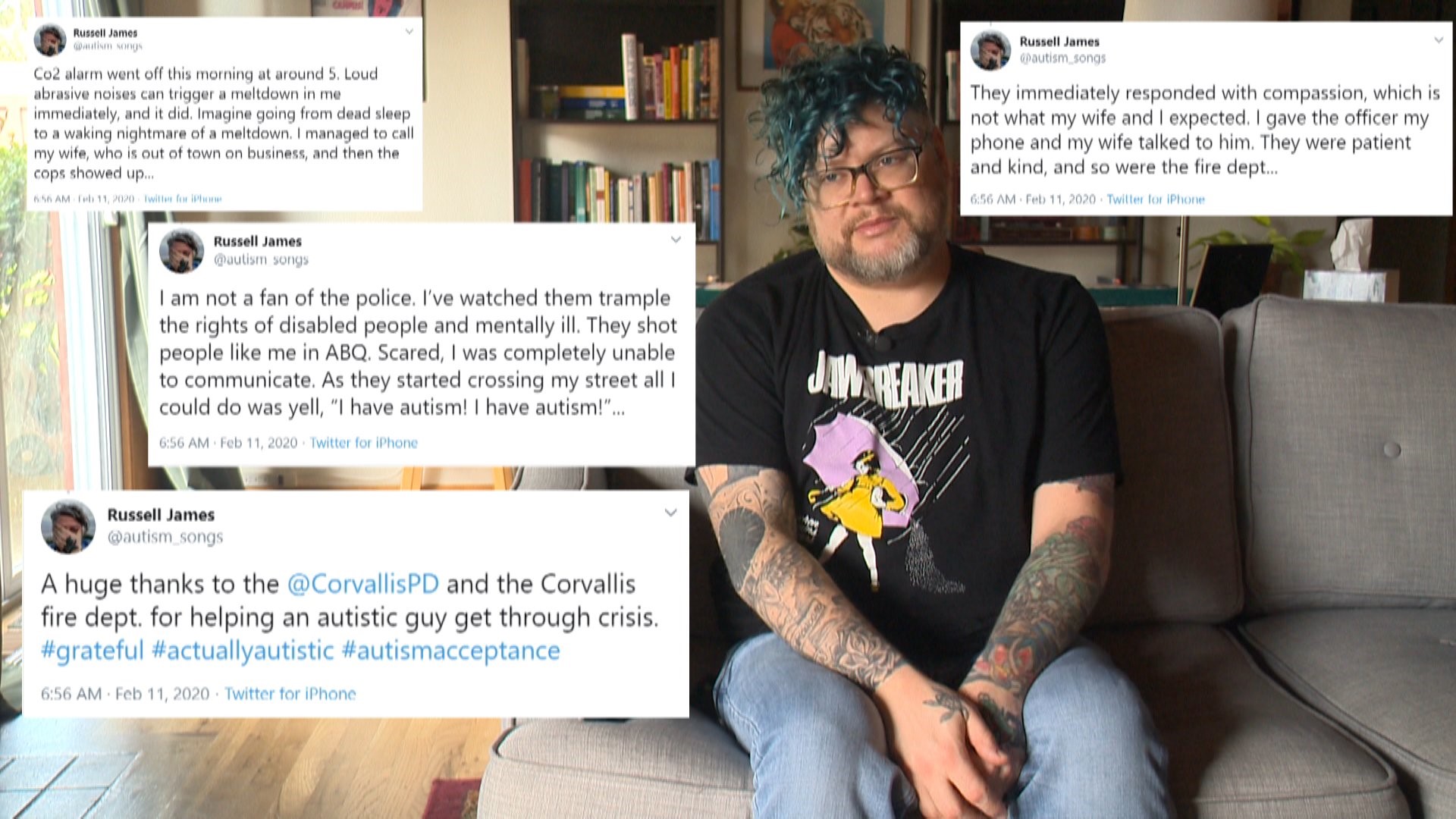CORVALLIS, Ore. — Standing in his Corvallis kitchen, Russell James and his wife Deborah plan out their week's schedule. It's something they do daily, so Russell can be prepared for the day's events.
Structure is what he relies on. He's autistic and proud of it.
"I see the world in a way that you don't and I see the world in a way that a lot of people don't," James said. "We're fine, we're really special people and our experiences should be shared and understood."
His arms are covered in tattoos and on his left hand is a tattoo of a bird, with the words "Lonely Bird."
"It's based on a song I wrote. It's about autism. I kind of see myself as a lonely bird at times," James said.
James has a sensory processing disorder. He hears sounds louder and smells stronger.
"The slightest sounds can sound like thunder in my ears and the loudest sounds, it's like an electric shock going through my body or like I'm experiencing an earthquake within my body," he explained.
James is not alone. According to the CDC, Sensory Processing Disorder can affect anyone. Studies indicate that 5% to 16% of children exhibit symptoms of SPD.
"I have autism and the thing about autism is that there are so many different profiles of autism. Neurodiversity is just that. It is diverse. My experience with autism is not everyone's experience with autism," James said.
His wife works remotely from their home in Corvallis, doing business out of Albuquerque, New Mexico. For a week at a time, she flies down, leaving James home by himself, something he's used to.
She had left for the airport at 4 a.m. He had fallen back asleep when his home's carbon monoxide alarm went off.
"For me, it doesn't just scare me. It immediately pushed me into what's called a meltdown. Where I was completely out of control," he said. "I was screaming over and over and I couldn't stop yelling and screaming and the dogs were going crazy."
He called his wife and she told him to get out of the house and go sit in the car. Someone passing by heard the screaming and alarm and called Corvallis police. Two officers responded and that gave him even more anxiety.
"I got out of the car and I just had my hands up and I had my phone out and I was like, 'I'm autistic. I'm autistic.' That's all I could think to say," James said.
He said the way police responded caught him by surprise. He expected aggression towards a man screaming and yelling. Instead, he received kindness and calm voices.
"They stopped me from running into traffic and they came running over and they were so calm and so chilled out that within five minutes that meltdown I was having, it was a thunderstorm and it went down to just a dull roar," James recalled.
The fire department helped shut off the alarm and James' meltdown had gone from a 10 to a 1. He sent out a series of tweets detailing what happened. Even thanking police for their response.
"I'm just grateful to them for the way that they responded and it blew away my expectations and because of that, because of that response I was able bring myself down," he said.
Corvallis police go through 40 hours of course training in crisis intervention. It focuses on those in a mental health crisis, but also can be used for what James experienced. Deescalation and a calm approach.
The two officers involved have been with Corvallis police for some time. Lt. Joel Goodwin said they both have experience volunteering with Special Olympics of Oregon and said all of that may have played a part in how they responded to James' house.
"It's always rewarding when somebody has a certain perception of law enforcement and when they have that interaction, it changes that perception. Really for us, this could be considered a routine call, but the thing we appreciate is Mr. James being willing to share this with everyone else is that his interaction changed his perceptions so hopefully it can change perceptions of other people as well," Goodwin said.
James is a folk music and bluegrass musician. He's traveled the country playing festivals and parks and is working on a new album. For someone with a sensory perception disorder, he's learned how to minimize what might set him off. When he goes out, he'll routinely wear noise-canceling headphones or specially made earplugs to help drown out any loud noises.
"You can see 100 people with autism and see 100 different types of autism and that's really important to understand," James said.
As far as the carbon monoxide alarm goes, James said he was told that his wife's car leaving sent exhaust into his garage and it seeped into his house just enough to set off that alarm.

